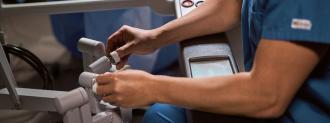There are about 48 million surgeries in the U.S. each year, and about 2% will have a complication. That’s roughly a million affected patients.
Surgeons, scientists, and others are working to reduce this toll by harnessing advances in processing power and connectivity. These data-centered innovations may allow clinicians and care teams to expand their capabilities and deliver consistently better care.
One key growth area is more precisely tracking the proficiencies of trainee surgeons, so they can effectively develop the skills they need. Intuitive is contributing to these exciting advances, helping hospitals and surgeons be more efficient and precise, so they can do more for their patients.
“For the last decade, we’ve really tried to understand [and] quantify surgeon performance,” says Andrew Hung, a urologist and robotic surgeon. “[With robotic surgery], we have the ability to not only collect the data, but also to analyze the data.”
Minimizing surgery risks
Intuitive created the first commercially viable robotic surgical system in the late 1990s, the da Vinci system. To date, more than 60,000 surgeons worldwide have been trained to use da Vinci.
For more than a century, surgical training has been based on the idea that students should mimic their mentors: In the words of famed surgeon William Stewart Halsted, “See one, do one, teach one.”
But this approach has limits. For many trainees, it may not be the most efficient way to learn, and it can be difficult to carefully evaluate how they are progressing.
“There are many different ways of doing an operation, and many nuances that we are just starting to appreciate about how surgeons move their hands or handle tissue,” says Dr. Gretchen Purcell Jackson, Intuitive’s vice president of digital research.
To better understand the complex details of surgery, surgeons and scientists are using data gathered from procedures. Robotic surgery lends itself to this because it is intrinsically digital, making it easier to collect and analyze its data.
Among those who are using this approach is Ankit Patel, an assistant professor of surgery and director of surgical education at the Emory School of Medicine in Atlanta. He is responsible for overseeing the training of all of the school’s surgical residents. The program is one of the largest in the country, and at times, it can be difficult for him to keep tabs on the individual progress of every trainee.
Now he has some help. Last year, Intuitive introduced My Intuitive, an app that allows him to precisely track each trainee’s individual development. My Intuitive, which provides surgeons with a range of comprehensive metrics on individual surgical performance, lets him pull up data on a range of variables, such as how efficient a resident’s movements are during an operation.
“For the first time, we have a digital way of evaluating residents and fellows… We have real-time access to their surgeries. It’s objective data rather than subjective. Now we can actually individualize training in a meaningful way.”
Dr. Ankit Patel
One of Dr. Patel’s trainees is Dr. Katherine Fay, a general surgery resident graduate at Emory. She says the app helps her track her progress as a surgeon. She tracks variables such as how long she is using certain instruments, or where in the procedure she has slowed down.
“Being able to take that information and look at it after the operation really improves your skill set in a practical application standpoint,” Dr. Fay says.
The app is just one of the ways that Intuitive is leveraging the enormous potential of digital intelligence, using advances in processing power and connectivity to help hospitals and surgeons be more efficient and more precise – to do more for their patients.
Ultimately, all of this work will continue to help Intuitive achieve the goal that it has had from the very outset – helping more doctors and hospitals use less invasive interventions to deliver the right treatment, to the right patient, at the right time.
As Dr. Patel says, “This is only the beginning. There is so much more we can do.”






